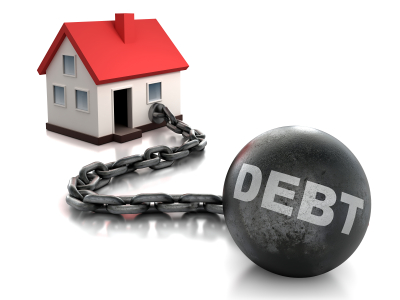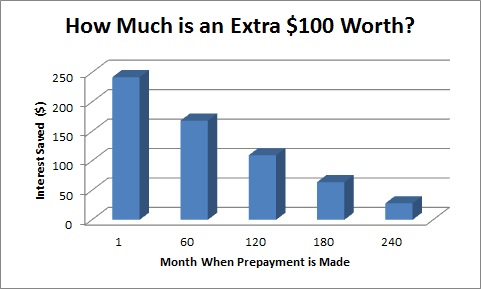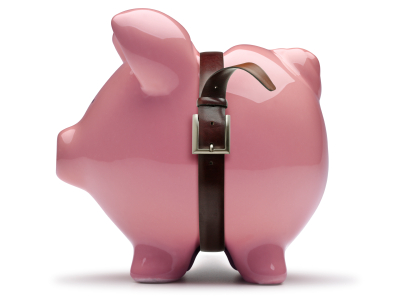S&P Lowers Outlook on U.S. Government Debt
April 25, 2011Fed Confirms End Date for QE II
May 2, 2011Mortgage debt can be intimidating; it is a massive personal liability that typically takes decades to pay off.
During the early years of a loan, it can be downright depressing to see how much of a scheduled payment is used to cover the cost of interest, and how little of each pa yment actually goes towards reducing principal.
yment actually goes towards reducing principal.
Not surprisingly, when their mountain of debt is at its highest point, borrowers don’t seem motivated to accelerate their rate of repayment, while conversely, borrowers who have only a few years left on their mortgage are willing to make a lot of extra sacrifices to shorten the time it will take to become mortgage free.
While human nature has most of us picking up the pace only when the finish line is in sight, in today’s post I’ll run some basic numbers to show you why the best bang for your extra payment buck is in the early years of your mortgage. Then, once you see the benefit of chipping away early, I’ll offer some strategies on the best way to go about doing this and close with a special tip for variable-rate mortgage borrowers.
To keep the math simple, let’s assume that you have borrowed $250,000 at an interest rate of 5%, and that your mortgage is being amortized over 25 years. (Note: your amortization period tells you how long it would take to pay off your entire mortgage if your interest rate stays the same, and if you make only your regular, contractual payments.) We’ll then assume that you add one additional payment of $100 at different times over the life of your loan and calculate how much interest you will save depending on when you do this.
 The chart on the left shows what happens if you make that extra payment in the first month, the sixtieth month, the one-hundred and twentieth month etc., and the blue bars show how much interest that extra payment will save you over the life of your loan. As you can see, making that extra payment early saves you much more in the long run (interest savings by paying in the first month = $242.21, interest savings in month 240 = $27.98).
The chart on the left shows what happens if you make that extra payment in the first month, the sixtieth month, the one-hundred and twentieth month etc., and the blue bars show how much interest that extra payment will save you over the life of your loan. As you can see, making that extra payment early saves you much more in the long run (interest savings by paying in the first month = $242.21, interest savings in month 240 = $27.98).
So if you’re a first-time home buyer who sees the wisdom in making extra payments on your mortgage, what is the best way to set this up? Many well-intentioned borrowers plan to make extra payments periodically, when they have surplus cash available, rather than scheduling to have an extra payment taken regularly by their lender.
The only problem with this approach is that it almost never works.
If you’re like most people, you will always find some excuse for spending the extra cash, so realistically, the only way to ensure that you follow through with the extra payments is to make them automatically. You have two options for doing this:
Option One – Set your payment above the minimum required by the lender on Day One. Once the overpayment is built into your mortgage contract, it’s difficult to undo so you’re essentially forcing yourself to meet this obligation.

Option Two –Schedule your lender to take a separate, extra payment from your account at the same time that they collect your regular payment. The advantage of this approach is that, if your circumstances change, you can adjust the additional payment more easily than in Option One, because it is not baked into the terms of your contract.
When you’re deciding how much extra you want to pay, try to stick with an amount that you know you can comfortably manage. (To see what the impact of making extra payments looks like, check out my mortgage payment calculator.)
If you’re in a variable-rate mortgage, I would advise you to bank the interest-rate savings you enjoy today by setting your variable payment at the level you would have been paying if you had chosen the current fixed rate. Here’s how it works.
Bank the Savings – Tip for Variable-rate Mortgage Borrowers
Let’s use an example to illustrate:
Assume that you have a $250,000 mortgage to be amortized over 25 years. You choose a five-year variable-rate mortgage currently priced at 2.50%, which makes your monthly payment $1,119. Also assume that you could have had a five-year fixed-rate mortgage at 3.54% with a monthly payment of $1,253.
Instead of paying $1,119/month, you decide to set your payment at $1,253/month (which is the equivalent fixed-rate payment). This means you are making an extra payment of $134 each month ($1,253 – $1,119 = $134) for as long as your variable rate stays at 2.50%.
Here is what that does for you:
- An extra payment of $134/month for five years will have reduced your principal by an extra $8,552 at the end of the first five years when your mortgage comes up for renewal, and can save you up to $12,000 in interest over the life of your loan.
- Your monthly mortgage payment will not increase until your current 2.50% rate rises above 3.54% (because your payment was set at 3.54% to begin with). This gives you more payment predictability than if you were only paying the minimum amount. In this way, you are benefiting from some of the protection you would have had if you had chosen the fixed rate. It’s a good compromise.
The best part is, every variable-rate mortgage holder can afford to do this. I know because the only way to get a variable rate today is to prove to your lender that you can afford to pay a rate of 5.19%, which is the current Mortgage Qualifying Rate that lender will uses to qualify you. As such, setting your mortgage payment based on a rate of only 3.54% should be a snap!
If you’re a first-time home buyer, you may feel like it’ll take forever to pay off your mortgage. But like the power of water dripping on a stone, a little extra prepayment, especially if you start early in your mortgage’s life cycle, can dramatically shorten the amount of time it will take you to become mortgage free.








9 Comments
Hi Dave,
Getting rid of debt is good, but is paying (extra) down the mortgage going to put one in a better place financially? If take that to the extreme you are better paying cash for the house and saving the interest cost! If real estate goes up that was a poor decision because you could have bought several houses and could have made more money. If real estate crashed (like the US) paying cash also hurt because that money is now worth less.
Should the money go somewhere else? Banks will tell you put the extra money in RRSPs and put the tax refund against the mortgage. Or pay extra on the mortgage depends on the day and the branch you talk to.
Both ideas are fine on paper and many years old. What it does not factor is inflation, taxes, risk management such as disability or premature death as well as lost opportunity costs.
Hi Dave,
I like the idea of setting up the payments at one’s MQR – sounds much wiser than the anniversary payment feature that I was planning for. RRSP/TFSA v/s additional mortgage payment is an age old question but so far I am leaning towards maximising the TFSA simply because the returns are higher (atleast for now).
thanks for the post!
Priyank
Hi Priyank,
That is an age old debate. On the one hand, paying off your mortgage gives you a guaranteed return on your money because you are saving interest cost, but investing can produce higher returns and help diversify your balance sheet.
As long as the extra money is saved/invested rather than spent, I think you’ll be in good shape.
Best,
Dave
Hi Dave – would it make sense at all to borrow money from say a loc and prepay your mortgage even though the interest rate on the loc is higher (3.5% loc vs. 2.1% mortgage).
Thanks,
Ron
Hi Ron,
Is this to convert your interest from non-deductible mortgage interest to deductible interest instead? If so, then the answe to your question depends in part on your marginal tax rate.
Can you give me more detail?
Best,
Dave
I actually have a tendency to go along with all the things
that has been put into writing inside “The Power of Prepayment | Dave The
Mortgage Planner” http://359igri.com . Thanks a lot for all the information.
Thanks,Edith
Good for you Edith. I’m sure your mortgage balance is better for it!
Dave
Hi Dave. Thx for your blog. I haven’t found any online calculators to estimate the effect of a pre-payment so this has been helpful. So question for you… I have a mortgage and am allowed to make a once a year prepayment, which I was going to do this year. But I only have 1 more year to go on my term. According to you, it’s not going to make a big difference being in my last year… so perhaps my cash is better invested or saved until I go to renew and can borrow less? Details are mortgage balance today $163k, prepayment allowed $25k at 3.42% fixed for one more year. What would you do?
Hi Susan,
Thanks for your email.
In answer to your question, prepayments can make a big difference to the amount of interest that you pay over time and to be clear, this is true even if you are in the last year of your mortgage term (in the graph provided, the final year is the final year of the amortization period, not the final year of the mortgage term).
Best regards,
Dave